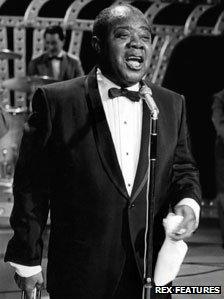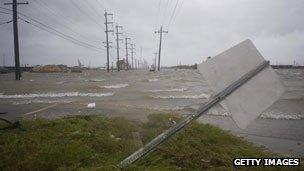Smashed Hits: How political is What A Wonderful World?
- Published
- comments
David Attenborough has performed a version of What A Wonderful World to soundtrack the BBC's nature coverage. Why did it take so long for this song to become a standard, and does it have a political message?
It's performed by a trumpeter whose lungs were too weak to play on the song and was never a hit in its homeland, reaching number 116 in the charts.
It has since become a standard, performed by the Celine Dions, Sarah Brightmans and Lesley Garretts of the world, and its success may be down to the same effects of age that prevented Louis Armstrong from playing a note.
Its creators, producer Bob Thiele and songwriter George David Weiss, hoped that Armstrong's grandfatherly image would help convey the song's message - and the message was political.
The single was released in 1968, a year in which America saw curfews as race riots spread from Newark and Detroit to over 100 cities. There were fears of a second civil war and the violence included attacks on Jewish shops.
Peter Ling, professor of American Studies at Nottingham, told the BBC that the Jewish-American Thiele and Weiss saw Armstrong as "the perfect ambassador to restore race relations between white people like them and the African-American community."
Unlike that of many black artists, Armstrong's appeal extended irrespective of race, and the hope was that a 66-year-old on the airwaves extolling the virtues of goodwill would wield some heft - the world is wonderful, and so are we all.
Not everyone was convinced, which may account for the single's initial commercial failure. Since the 1950s, Armstrong had been dealing with accusations of being an "Uncle Tom" - of subserviently providing entertainment for white America. Armstrong himself, naturally, disagreed.

Armstrong's appeal transcended race
"Some of you young folks been saying to me: 'Hey, Pops - what do you mean, what a wonderful world? How about all them wars all over the place, you call them wonderful?'" Armstrong said as he introduced a live performance of the song - words which are best read with his gravelly delivery in mind.
"But how about listening to old Pops for a minute? Seems to me it ain't the world that's so bad but what we're doing to it, and all I'm saying is: see what a wonderful world it would be if only we'd give it a chance. Love, baby - love. That's the secret."
Like other songs with universal themes - say, REM's Everybody Hurts, external - the imprecision of the lyric is seen by the many it reaches as a strength and by others as a weakness - a vagueness approaching greeting-card levels.
It's also irrepressibly public-spirited, people shaking hands on the street are, apparently, "saying I love you" - illustrated in the Attenborough video, oddly, by two hippopotamuses fighting each other in the Okavango river.
And this is not the first time What A Wonderful World's generosity of spirit has been juxtaposed with less-than-cheerful imagery.
The song became better known in America after its ironic use to soundtrack the carnage of war in the 1987 film Good Morning Vietnam. In the UK, it was played at the end of The Hitchhiker's Guide To The Galaxy as Ford and Arthur anticipate the destruction of the Earth by the Vogons, and puppet show Spitting Image rewrote it with a pollution theme as We've Ruined The World: "I see forests cut down, great ozone holes..."
Suffering subversion is an occupational hazard for earnest, buoyant music, but What A Wonderful World is still used in sincere contexts, for example in tribute to the people of Armstrong's hometown New Orleans following Hurricane Katrina.

The song became a tribute to the people of New Orleans after Hurricane Katrina
It also crops up on soundtracks in non-ironic contexts, though these days you're more likely to hear it as part of a medley with Over The Rainbow, performed by Hawaiian singer Israel Kamakawiwo'ole in a bare-bones ukulele format that lends an aura of authenticity.
To some, you could add "spirituality" to "authenticity". Like Bridge Over Troubled Water and Stand By Me, it's in a genre you might call "secular sacred" - as at home in choral versions on Songs of Praise as it is in the record collections of atheists.
Its latest rendition shares an authoritative feel, the 85-year-old Attenborough giving the same sense of having seen it all in the line "they'll learn much more than I'll ever know" to Armstrong's original, although the prodigious smoker of marijuana and the former controller of BBC Two perhaps have little else in common.
A key difference between their recordings comes at the end: Armstrong's gargled "Oh yeah" is replaced by Attenborough's more reserved "Quite simply wonderful".